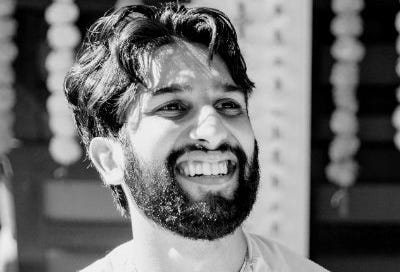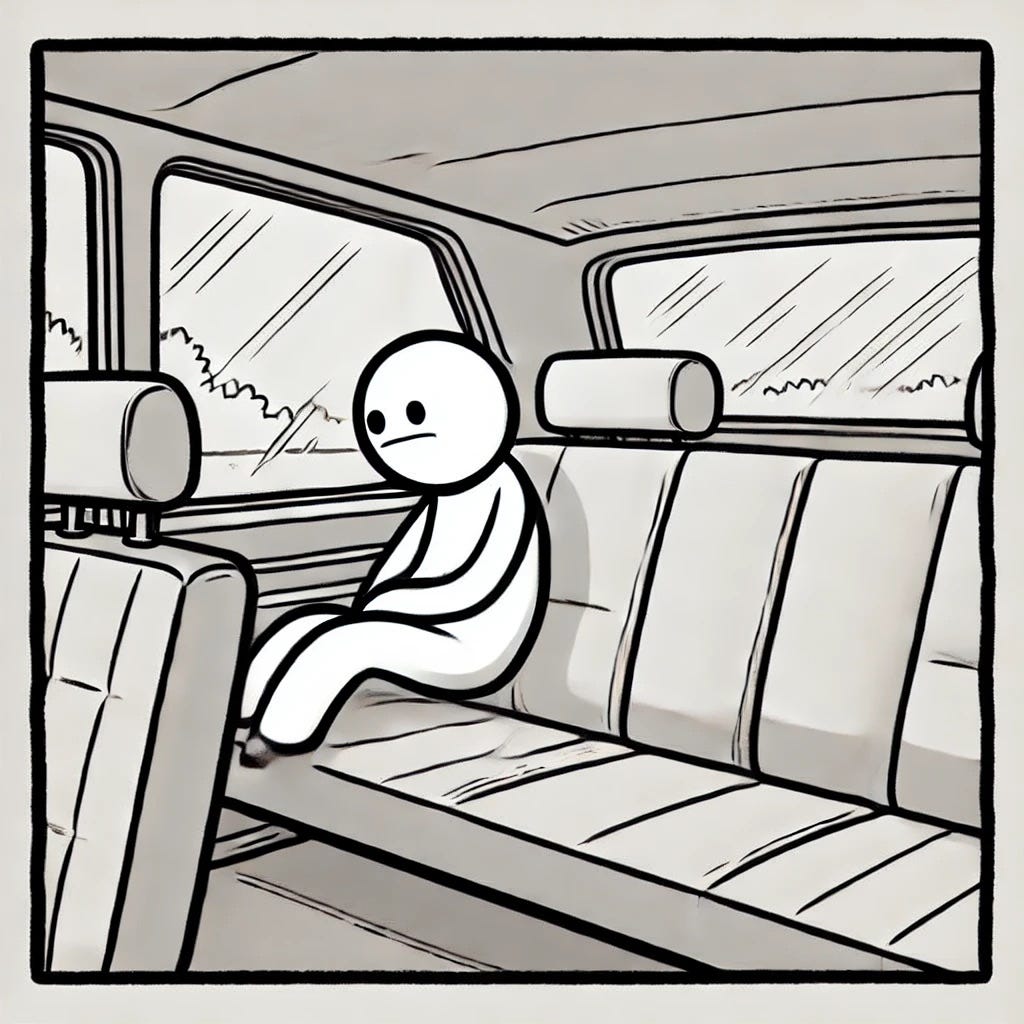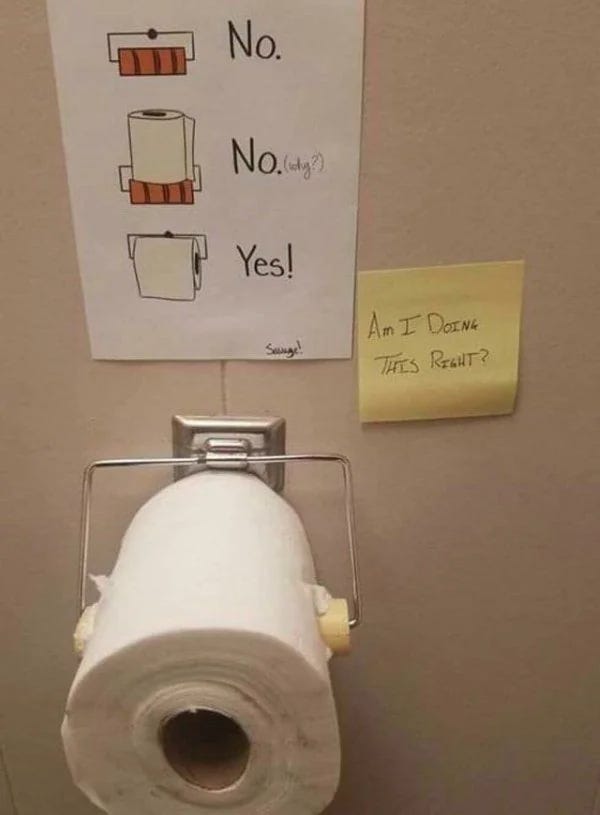Hot Tub Conversations : Saalik Lokhandwala
Quitting jobs and why Uber is making us lonelier (Szn 1: Ep 2)
Today’s Hot Tub convo is with Saalik (sah-lick) Lokhandwala 🧖♂️
Saalik and I linked up last year through
’s Pathless Path community. Saalik was about to say ✌️ to his job and the US, and we stayed in touch while he traveled Southeast Asia and I lived vicariously through him. He posts thoughtful writing on his Substack The Spoonful, and every time we talk I come away inspired and with some great recs. Saalik is back in Boston now and working on launching a web dev and media production studio with his brothers called LokBros Studios.With his sabbatical winding down and mine just starting (I left my job last month!) I was grateful to hop in the tub with him and talk work, life, and why Uber is making us lonelier.
How do you feel like your relationship to work has changed since your sabbatical and travel?
It’s still percolating, and it's one that I ask myself a lot…is there going to be a point where I actually figure this out? Probably not.
One interesting thing that happened on sabbatical was that I wanted to work.
Work feels like kind of a sacred thing to me. And I know that work has a lot of different connotations, and in pop culture, work means something hard that we have to do to get a paycheck for, but I'm not really tied to that definition at all. I see it as expending effort in service of others.
On sabbatical it was really fun to see myself naturally reaching for code and writing and just wanting to do those things because they felt good – not because I needed to do them for any particular reason. So that was kind of cool to watch myself be really fired up to start something.
What’s one thing that has really caught your curiosity recently?
Family businesses. I think family businesses are super underrated, and also the oldest form of business and life organization. Families that have family businesses have both a practical necessity and an emotional necessity for each other.
It's far more common in the east to see families who are working together on something and I was really inspired by it.
It got me really jazzed up to come back and work with family on something. LokBros Studio, the studio that my brothers and I are now working on, just kinda happened, in part based on a desire to structure ourselves similar to a family business, but in a tech-forward way.
Brandon
I feel like a lot of people's reaction would be “Oh, I don't know if I could start a business with my siblings or my mom or dad,” but I love thinking about it from the opposite side as something that can really bind a family together. I think that's a whole different mindset that a lot of people probably would write off until they see it in practice.
Saalik
Yeah I mean, I saw the negative aspects of it too… there's a lot of compromise that has to happen because there’s so much mixed into it. There’s a different type of emotional layer on top of things.
But in a family business it’s a different type of work. Sometimes my brothers are like “Okay, we just need to not talk about work for like 10 minutes and go watch an anime or something.” It's not necessarily easy, but it's really fulfilling, and I think I'm just lucky that my brothers and parents are really fun to work with.
How about you? What’s one thing that caught your curiosity recently?
Brandon
I’ve been going deep on a concept called time banking. It’s basically an economic model where time is the unit of currency, rather than money. So if I were part of a time bank in my area and I watched somebody's kids for an hour, I would earn an hour that I could trade for an hour of somebody cooking for me, or doing home repair. So it's kind of like bartering, but at the service level. It’s actually been a movement around for a long time, but it's never quite caught on.
The podcast Freakonomics just did an episode1 on it last month with Andrew Yang, who is a big proponent of it, so it feels like it’s having a bit of a resurgence. My friend
is getting involved and advising with some organizations doing time banking, and I’ve found myself just excited about it so I’ve been thinking about it with him.Saalik
Wow, ya, I feel like it would work really well with people who live in a tight knit community.
Brandon
Ya totally, and I feel like it would work better if a bunch of people as a group, who already had good vibes, bought into it together. Because I think the devil is in the details with this, like there is going to be friction and times when it doesn’t quite feel fair, so you need a certain amount of goodwill to stick with it to get to a point where you can say, as a whole, this is worth the sacrifice because this is so much better as a whole to how I was doing things, and now I have this community of people I feel connected to and feel supported by.
Saalik
I love it in terms of reshaping how we think about work and community. I feel like every basic thing is getting commoditized right now, like Rover or Instacart. They’re cool services, but they are also just transactionalizing things that used to be part of relationships, and that might not actually make us better off.
Brandon
Ya asking your friend for a ride to the airport now seems like such a bigger favor because Uber exists, so these things are kind of pulling people apart. Friendships can kinda get built off of trading favors in a way. A friend driving you to the airport early in the morning - that actually meant something in the context of a friendship.
Anything you're currently recommending?
Saalik
Have you read David Whyte's Crossing the Unknown Sea?
Brandon
Yes! I loved that book, but I found it really hard to describe it to other people because it has poetry in it, but it’s also like narrative nonfiction and I thought that was dope. Kinda genre-bending. How would you describe it?
Saalik
I would describe it as kind of an experience. It’s the experience of understanding that work is something more than just showing up at a thing and collecting a paycheck. There's a deeper meaning and purpose and almost like an innate desire that we have that moves us towards it. That’s the vibe that the book somehow encapsulates and I loved it.
Brandon
I love how when he does recite poetry, he’ll include the background right alongside it. He has a series on the Waking Up app and I’ve seen other videos where he does that and it feels like he’s delivering a freestyle sermon.
D Whyte dropping bars:
Saalik
I'm definitely gonna check that out. What else are you recommending?
Brandon
I’ve been telling everyone about this because I do it almost every day - this NSDR Yoga Nidra on Insight timer. I wrote about rest recently and I feel like I’m more aware of when my body just hits a wall in the afternoon and now it just feels so wrong to just fucking force through it. It’s a luxury I have, working on my own schedule from home, but I think it’s given me more awareness that sometimes you just gotta get horizontal for 20 and that’s a totally reasonable thing to work into your day.
Saalik
Ooh nice, I’ll have to check that out. One more recommendation from me is a book called The Culture Map by Erin Meyer. It's technically a book about global business, but it captured certain things about living abroad and gave language to things that I had intuited but didn't have the words for – especially around the difference between Eastern and Western culture and how those differences are wholly different ways of operating.
One of my biggest takeaways from that book was understanding high context versus low context environments.
Japan is one of the most high context cultures in the world. One of the examples in the book was a husband and wife in their kitchen. They said nothing as they moved about, but based on their body language, they were sending each other clear messages. They had a whole conversation in the quiet space of arranging a meal.
It’s part of the culture that they pay such close attention to those things. Each little aspect of body language means something as explicit as the words I'm speaking to you.
Meanwhile in the US, because it has such a diverse population and it’s not homogenous –there isn’t as strong of a shared culture like Japan – it has to be low context. You have to be explicit about communication to be understood by everyone.
Thanks for joining me & Saalik in the tub.
I leave you with 2 questions for the comment section:
What are you recommending right now?
What’s the last favor or nice thing someone did for you that meant a lot?







Woohoo quitting jobs! 😂 I quit my "main" one in June.
There's def something there about what we lose in genuine community relationship when outsourcing and paying for help. Instead of it being an investment of trust and vulnerability to ask our friends for help, it becomes a kind of respect to not ask them, but I think that big and small separation between us snowballs if unchecked...
Also, love thinking about high context vs. low context cultures. So much food for thought for communication, and mishaps in it. Interesting to think about how one generation of a family could be more high context (Eastern-raised) and the next more low context (Western-raised).
Love the post and thanks for the shout-out!
Finding rest and stillness between jobs can be such a blessing and so transformative. So happy you’re doing yours with such intention.
And let’s catch up soon, got lots of updates and exciting things happening on the timebank front! 😁